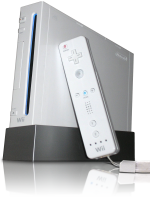 One of my distractions last weekend was my new Nintendo Wii. After playing my first game, I tried to get the Internet connection working without success. After spending few hours I finally found out why: The Wii Connection test DOES NOT send a user agent, and apparently, my ISP uses a transparent proxy that will deny access to anything that doesn’t provide “User-Agent” header. It took me quite a long time to realize this.
One of my distractions last weekend was my new Nintendo Wii. After playing my first game, I tried to get the Internet connection working without success. After spending few hours I finally found out why: The Wii Connection test DOES NOT send a user agent, and apparently, my ISP uses a transparent proxy that will deny access to anything that doesn’t provide “User-Agent” header. It took me quite a long time to realize this.
It is quite a long story how I realized the problem. Connecting Wii trough direct connection never works, so I use my proxy server. It didn’t work either, so I looked at the log file, and tried to connect to URL listed in the log file (http://conntest.nintendowifi.net/) using my browser through my proxy server, and it works. I tried again using the Wii and now it works also. At that time I still don’t understand why. I just thought that Wii needs the proxy server, and since I don’t want to turn on my computer just to access the Internet through my Wii, I tried to install tinyproxy on my openwrt linksys router, and it still doesn’t work.
After sniffing with WireShark, I realized the difference in the header (Wii only sends 1 line of GET request). Squid is a caching server, when the Wii asks for the same document, it is already in the proxy server (because I tested the URL with Firefox), so the request was handled properly by my squid.
Realizing that, I installed squid on my router, with wget periodically pulling the connection test to refresh the cache. Now everything is OK, and I think may be I can just redirect the request to http://conntest.nintendowifi.net/ to my server, but I will wait to check at my squid log to make sure whether this URL is used for connection test only or for something else.
 I have concluded the source of failure for many applications is that the sendfile syscall on my port doesn’t work. To be precise, sendfile sends garbage data to the other side. I have an USB to Ethernet adapter, and using that adapter, the problem disappears. So the conclusion is that my network driver is buggy.
I have concluded the source of failure for many applications is that the sendfile syscall on my port doesn’t work. To be precise, sendfile sends garbage data to the other side. I have an USB to Ethernet adapter, and using that adapter, the problem disappears. So the conclusion is that my network driver is buggy.


 One of my distractions last weekend was my new Nintendo Wii. After playing my first game, I tried to get the Internet connection working without success. After spending few hours I finally found out why: The Wii Connection test DOES NOT send a user agent, and apparently, my ISP uses a transparent proxy that will deny access to anything that doesn’t provide “User-Agent” header. It took me quite a long time to realize this.
One of my distractions last weekend was my new Nintendo Wii. After playing my first game, I tried to get the Internet connection working without success. After spending few hours I finally found out why: The Wii Connection test DOES NOT send a user agent, and apparently, my ISP uses a transparent proxy that will deny access to anything that doesn’t provide “User-Agent” header. It took me quite a long time to realize this.